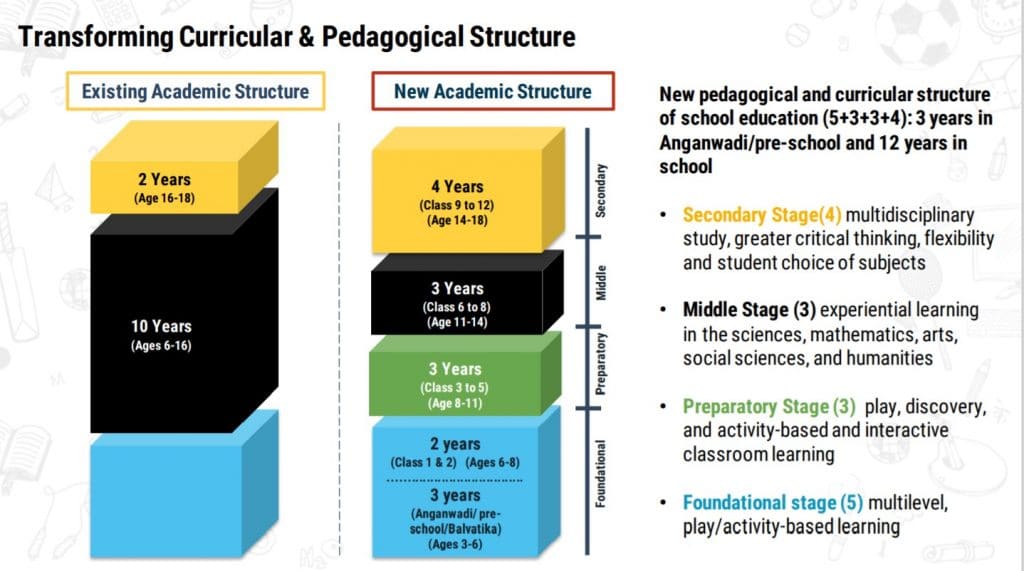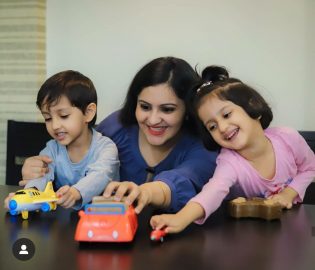In what promises to be a massive reform in the education sector, across all levels, the government has unveiled the New Education Policy (NEP), 2020. This policy change comes after 34 years, and intends to address many of the known shortcomings at various levels. While the policy sets the framework and intent, of course much will depend on how these reforms are implemented over the next few years, in order for the benefits to be realized.
In this post, the focus is on understanding the key changes in the policy for school education, and what they mean for school kids (i.e. K-12) and their parents. So let’s dive right in.
The key principles underlying the NEP, as these apply to curriculum and teaching methods are : diversity & local context, conceptual understanding over rote-learning, encouraging creativity & critical thinking, and enhanced use of technology. It envisages providing universal access to education at all levels, and to all children, using a multi-pronged approach.
First, the NEP proposes a change in grade structure, from the current 10+2 to 5+3+3+4. This structural change can have many ramifications. One, It recognises & includes the pre-school segment, which has so far been out of the 10+2 structure, and hence suffered from lack of standards, consistency of curriculum and learning outcomes. This brings into focus the very critical Early Childhood Education comprising 3 years of Pre-school/Anganwadi and Grade 1&2 of primary, by defining curriculum, methods and outcomes, which will be drafted by the NCERT. Secondly, by measuring the achievement of expected learning outcomes, through assessments in Grade 3,5 & 8, there is expected to be greater accountability on schools to ensure quality & consistency of teaching.

The second major change, concerning the early years, is that the medium of instruction upto grade 5 (and maybe beyond) will be the mother tongue/ local language. Each state can decide upon the 3 languages to be taught. This can have far reaching consequences – while promoting local languages and culture, this may limit learning of the English language in the early years, and this is likely to have implications on higher education and employability, in a globalised world. This is probably the most controversional provision in the policy, and likely to see strong opposition from parents who are hooked to seeking admission into English-medium schools for their kids, as well as from schools, for whom this will be massive change. [Update: The government has clarified that the medium being the mother tongue/local language is only an advisory, and will not be mandatory]
Thirdly, the changes in curriculum & pedagogy will include focus on experiential learning, critical thinking, integration of subjects across arts, science & maths, integrated use of technology for grades 6-12; local ethics, values, traditions and knowledge systems. The policy also envisages integration of vocational education at all levels, including vocational internships in grades 6-8. And yes, there are provisions to reduce the weight of bags, and bagless days!
Fourthly, changes in the examinations for Grades 9-12 will bring great relief to stressed kids and parents, with board exams set to become ‘easier’. Yes, Board exams for grades 10 and 12 shall remain, but there shall be major changes in pattern commencing from 2022-23 session, for class 10 and 2024-25 for class 12. Reduced curriculum and levels for various subjects, should also ease the burden considerably.

Fifth, the policy aims to make schooling more inclusive with multiple initiatives for socio-economically disadvantaged groups, girls, children with special needs, as well as those for gifted children.
While the changes outlined above are the major ones directly impacting school students, the policy also defines transformational changes in teacher development & empowerment, structural changes for schools and higher education, use of digital technologies etc, which shall enable these changes in curriculum & pedagogy.
Even though the policy itself is a huge milestone in Indian Education, it will take several years of phased implementation of various initiatives outlined in this. As with any transformational policy, there will be positives and negatives, but on the face of it, this policy heralds much-needed reforms for Indian education.
Do share your thoughts on the NEP and how you see it impacting your kids. What do you like the most, and what do you disagree with?











I loved the concept of Bal Bhavans where kids can engaged in art, career play activities as a part of special day boarding school. Would be interested to know more about it.
If I were to list the best part of the policy, it would be the revised academic structure 5-3-3-4. Preschools have been brought under the formal system – this should formalize the preschool sector and guidelines largely. Given a majority of parents nowadays enroll their kids in preschools, this is a big relief.
The new measures are really wonderful. As a parent, I am quite happy to see this. But, there doesn’t seem to be anything on homeschoolers as far as I know. My friend is homeschooling her kid and she had hoped that NEP would give some clarity about homeschooled kids.
NEP comes after 34 year long wait. Some points are great. But , some like mother tongue/regional language till Class 5 don’t sit well with me. Will it not create a language divide in communication in schools? It is also not clear whether English language will be introduced in which class.
Are these guidelines applicable across all education boards – ICSE, CBSE, State boards, etc?
Superb insights and well-presented thoughts. The new policy sounds promising. Now, I hope, implementation happens smoothly and as per the proposed timelines.
This article has summed up the key points very well!